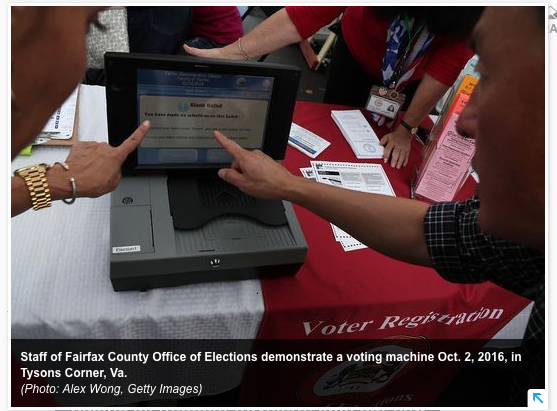 Deborah Barfield Berry Dec. 15, 2016
Deborah Barfield Berry Dec. 15, 2016
SILVER SPRING, Md. — A government agency that assists states in improving voting systems may have been the target of a hacker, although the breach was blocked very quickly, and no ballots were at risk. CLICK IMAGE for link to story.
The Election Assistance Commission (EAC) said Thursday that the FBI is investigating a “potential intrusion into an EAC web-facing application” and that access was blocked as soon as EAC officials learned of the possible breach.
News of the potential breach comes as reports of cyber security attacks in the U.S. presidential election have hit a fever pitch. But the possible event at the EAC appears to be unrelated to allegations that Russian hackers were trying to undermine the U.S. election.
Members of Congress are calling for hearings to investigate CIA allegations that Russia deployed hackers to disrupt the presidential election to help President-elect Donald Trump.
The EAC does not run elections. Congress created the commission in 2002 as part of the Help America Vote Act (HAVA) to help states improve their voting systems. The commission also serves as a source of election-related information and data.
“We’re hoping that this can be resolved relatively quickly,’’ said Thomas Hicks, chairman of the Election Assistance Commission. The breach appeared to have happened weeks after Election Day, he said. It’s not clear yet exactly when.
Hicks said the FBI is investigating how the person or person gained access, but “they don’t believe it’s a foreign government.’’
Hicks said information about elections or registrations was not compromised.
“We don’t have any information about voters,’’ he said. “The states are running elections.”
Read more:
Earlier Thursday, the EAC held a post-election briefing at its headquarters in Silver Spring, Md., to discuss a range of issues, including cyber attacks. State election officials and voting rights advocates said most elections went smoothly and dismissed concerns that voting systems could have been hacked.
“I am quite satisfied that it would be extremely difficult, if not impossible, to hack a national election in any meaningful way,” said Denise Merrill, president of the National Association of Secretaries of State and Connecticut’s Secretary of State. “I think we explored it quite thoroughly.”
Merrill said she spent a lot of time explaining that voting systems are not online and not vulnerable to hacking.
Federal and state election officials tried earlier in the year to ease voter concerns about the potential hacking of voting systems. State officials said they took extra precautions to guard against cyber attacks and other concerns.
“Everything seems to have gone smoothly from what we know so far,’’ Hicks said early Thursday.
“The electoral process was secure, its integrity was maintained,’’ said Don Palmer, a fellow with the Bipartisan Policy Center.
Palmer said there was “no evidence of hacking,’’ but said “we can always improve the voting process and give voters more options.”
Still, election officials concede it has been hard to ease voter concerns about cyber threats.
Adam Ambrogi, director of elections at The Democracy Fund, cited its poll that found nearly 40 percent of those surveyed had some concerns overall about electronic tampering or hacking.
Follow @dberrygannett on Twitter.


You must be logged in to post a comment Login